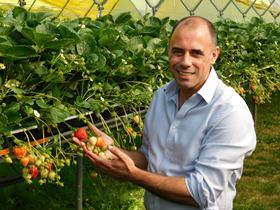
NIAB has welcomed the approval by both Houses of Parliament of new legislation to make it easier to conduct field trial research involving plants produced by new genetic technologies such as gene editing.
The Statutory Instrument cleared its final hurdle in theHouse of Lordslate on 14 March, having already been approved by a clear majority in the Commons.
“NIAB has been using gene editing experimentally in a variety of crops, includingwheat, barley, rice and strawberries, for several years. But because of the difficulties and costs of testing these novel cropsin the field, we have been unable to progress them beyond laboratory and glasshouse experimentation to evaluation in the field,” explained NIAB chief executiveProfessor Mario Caccamo.
“The measures introduced by this Statutory Instrument will make a big difference to prospects for research at NIAB and other research organisations.”
Caccamo pointed to six current NIAB research projects – both in-house and in collaboration with other partners – which stand to benefit immediately from the change in regulations, including research into flowering time variation in strawberries.
He added that greater access to gene editing would give a welcome boost to NIAB’s plans for a genetics and pre-breeding programme in pulse crops such as peas, beans and soya, to help unlock their potentialas a home-grown protein source with benefits for sustainable farming, healthy eating and climate change.
NIAB’s CEO believes gene editing offers a potentially transformative research tool and plant breeding technique which enables the same type of genetic changes selected for in traditional plant breeding but is much more precise and efficient.
“This Statutory Instrument marks a small but important step towards aligning our regulations with other parts of the world – such as Australia, Canada, Japan, Argentina, Brazil and the US – where simple gene edited plants are not regulated as GMOs,” he said.
“Adopting a more science-based and proportionate regulatory approach will help unlock the UK’s global leadership in plant genetics, fostering a research environment that encourages innovation in agriculture to address the most pressing challenges of today. This will help farmers grow crops that are morenutritious, more resilient to climate change and less reliant on pesticides or fertilisers.”
He added that the focus for gene editing research at NIAB is to help develop crops and farming systems that are less dependent on chemical pesticides and fertilisers, and which reduce the climate change impact of agriculture.



